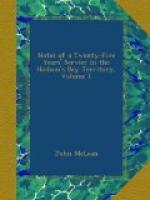I remained about six weeks in my native country, and set out for London, where I arrived early in November,—“the beginning of the gay season;” but it appeared to me the reverse. The city was shrouded in a cloud of condensed smoke and fog, that shut out the light of heaven. During three whole days the obscurity was so great that the steamboats were prevented from plying on the Thames, and the gas-lights were seen glimmering through the windows at noon-day. How applicable is the description of the Roman historian to the Rome of our day:—“Caput orbis terrarum, urbis magnificentiam augebant fora, templa, porticas, aquaeductus, theatra, horti denique, et ejus generis alia, ad quae vel lecta animus stupet.” My time was too limited, however, and the weather too unfavourable, to admit of my seeing all the “lions;” but who would think of leaving London without visiting that wonderful work—the Tunnel,—that lasting monument of the genius of a Brunell, and of the wealth and enterprise of British merchants!
A Cockney may well boast of his great city, its wealth, its vast population, and its magnificent buildings; but with regard to the Thames, of which he is equally proud,—he that has seen the St. Lawrence, the Hudson, the McKenzie, and many others, compared to which the Thames is but a rivulet, may be excused if he cannot view its not very limpid waters with the same extravagant admiration as the Londoner, who calls the Serpentine a river, and dignifies a pond of a few roods in extent with the name of a lake. Yet there is one feature about the Thames, of which he can scarcely be too proud, and which is unparalleled perhaps in the world,—the often-noticed “forest of masts,” extending farther than the eye can reach, and suggesting,—not the silence and solitude of the forests with which I have been familiar,—but the countless population, the wealth, and the grandeur of Britain; and the might and the majesty of civilized and industrious man.
I took leave of London on the 12th of September, and set out for Liverpool by railroad, and reached it in six hours. I had sufficient time to visit its docks, crowded by the ships of every nation; its warehouses containing the produce of every clime; and, though last, not least in my estimation, the splendid monument erected to the memory of Nelson. No monument of stone or brass is necessary to perpetuate our hero’s fame; he lives in the heart of every true Briton, and will ever live, till British oak and British prowess shall cease to “rule the waves.”
I embarked on the 15th of December on board a sailing-packet bound for New York. These vessels are so punctual to the hour of sailing advertised, that, if the wind proves contrary, and blows fresh, they are towed out to sea by steamboats. This proved to be our case, and we kept tacking about in the “chops” of the Channel for six days, when a fair wind sprung up that soon carried us out of sight of England. England! great and glorious country, adieu! I shall probably never see thee more; but in quitting thy white-cliffed shores, I quit not my ardent attachment and veneration for thee;—and now for thy eldest daughter beyond the ocean!




